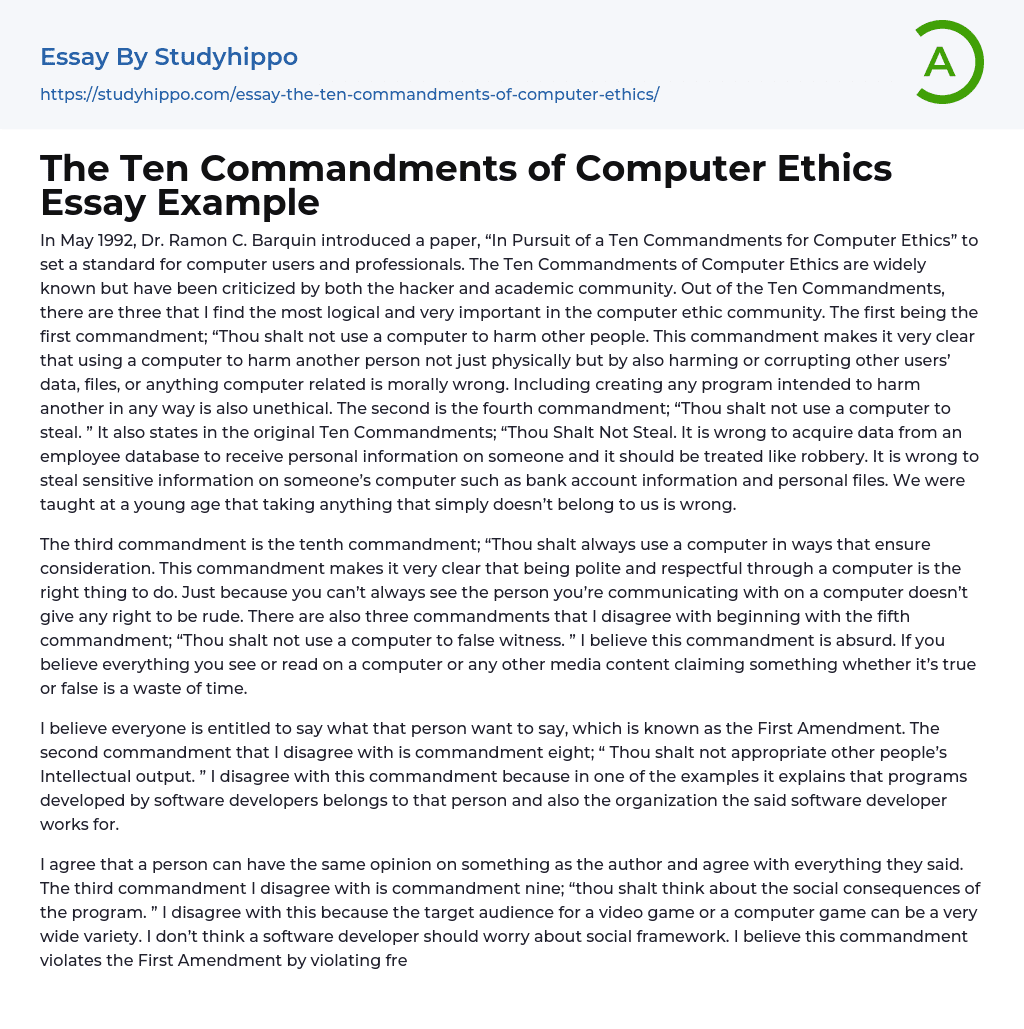In May 1992, Dr. Ramon C. Barquin introduced a paper, “In Pursuit of a Ten Commandments for Computer Ethics” to set a standard for computer users and professionals. The Ten Commandments of Computer Ethics are widely known but have been criticized by both the hacker and academic community. Out of the Ten Commandments, there are three that I find the most logical and very important in the computer ethic community. The first being the first commandment; “Thou shalt not use a computer to harm other people. This commandment makes it very clear that using a computer to harm another person not just physically but by also harming or corrupting other users’ data, files, or anything computer related is morally wrong. Including creating any program intended to harm another in any way is also unethical. The second is the fourth c
...ommandment; “Thou shalt not use a computer to steal. ” It also states in the original Ten Commandments; “Thou Shalt Not Steal. It is wrong to acquire data from an employee database to receive personal information on someone and it should be treated like robbery. It is wrong to steal sensitive information on someone’s computer such as bank account information and personal files. We were taught at a young age that taking anything that simply doesn’t belong to us is wrong.
The third commandment is the tenth commandment; “Thou shalt always use a computer in ways that ensure consideration. This commandment makes it very clear that being polite and respectful through a computer is the right thing to do. Just because you can’t always see the person you’re communicating with on a computer doesn’t give any right
to be rude. There are also three commandments that I disagree with beginning with the fifth commandment; “Thou shalt not use a computer to false witness. ” I believe this commandment is absurd. If you believe everything you see or read on a computer or any other media content claiming something whether it’s true or false is a waste of time.
I believe everyone is entitled to say what that person want to say, which is known as the First Amendment. The second commandment that I disagree with is commandment eight; “ Thou shalt not appropriate other people’s Intellectual output. ” I disagree with this commandment because in one of the examples it explains that programs developed by software developers belongs to that person and also the organization the said software developer works for.
I agree that a person can have the same opinion on something as the author and agree with everything they said. The third commandment I disagree with is commandment nine; “thou shalt think about the social consequences of the program. ” I disagree with this because the target audience for a video game or a computer game can be a very wide variety. I don’t think a software developer should worry about social framework. I believe this commandment violates the First Amendment by violating freedom of speech principle.
- Values of Life essays
- Ethical dilemma essays
- Normative Ethics essays
- Virtue Ethics essays
- Belief essays
- Deontology essays
- Moral essays
- Virtue essays
- Work Ethic essays
- Computer File essays
- Desktop Computer essays
- Servers essays
- Acceptance essays
- Age Of Enlightenment essays
- Child Observation essays
- Confucianism essays
- Conscience essays
- Critical Reflection essays
- Destiny essays
- Determinism essays
- Empiricism essays
- Environmentalism essays
- Epistemology essays
- Ethics essays
- Ethos essays
- Existence essays
- Existentialism essays
- Fate essays
- Free Will essays
- Functionalism essays
- Future essays
- Good And Evil essays
- Human Nature essays
- Individualism essays
- Meaning Of Life essays
- Metaphysics essays
- Natural Law essays
- Personal Philosophy essays
- Philosophers essays
- Philosophy Of Life essays
- Political Philosophy essays
- Pragmatism essays
- Reality essays
- Relativism essays
- Teaching Philosophy essays
- Time essays
- Transcendentalism essays
- Truth essays
- Utilitarianism essays




